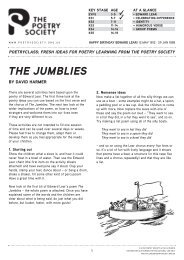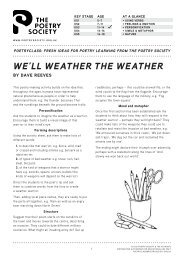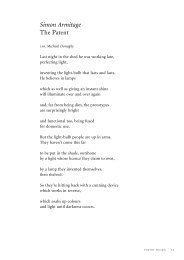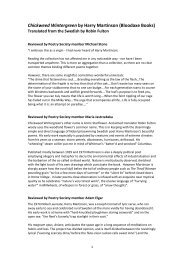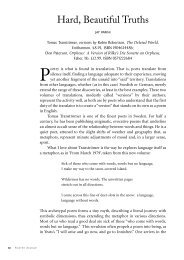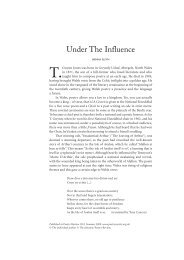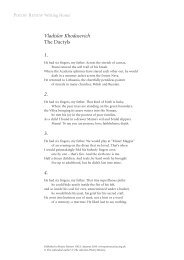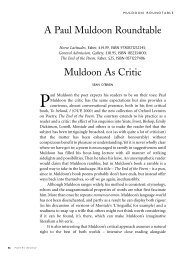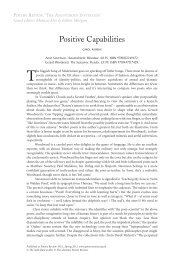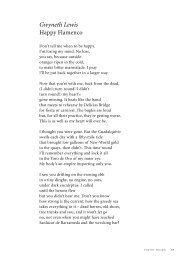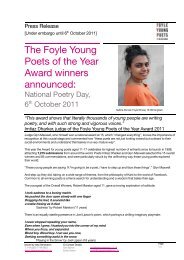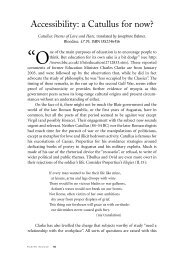Alan Brownjohn, Poetry Wars - The Poetry Society
Alan Brownjohn, Poetry Wars - The Poetry Society
Alan Brownjohn, Poetry Wars - The Poetry Society
Create successful ePaper yourself
Turn your PDF publications into a flip-book with our unique Google optimized e-Paper software.
<strong>Poetry</strong> <strong>Wars</strong><br />
ALAN BROWNJOHN<br />
Peter Barry, <strong>Poetry</strong> <strong>Wars</strong>: British <strong>Poetry</strong> of the 1970s and the Battle<br />
of Earls Court, Salt, £16.99, ISBN 139781844712489<br />
Nowadays, unless you speak to a few scarred survivors, you might not<br />
realise that the <strong>Poetry</strong> <strong>Society</strong> ‘wars’ of the 1970s ever happened.<br />
Best forgotten, then? De mortuis, etc.? No. Those battles were real,<br />
and depressing, and one way of reading this absorbing book is as a warning:<br />
Don’t get involved in literary organisations which are starved of cash but<br />
POETRY REVIEW 105
106 POETRY REVIEW<br />
richly endowed with inflated egos and conflicting tendencies. Old issues and<br />
obstreperous personalities can surface in any generation, and devour a<br />
lot of time.<br />
Peter Barry, who himself saw a little of the action, sides with the 1970s<br />
modernists, offering a fastidiously researched and reasonably fair account of<br />
what happened – coming from that side of the lines, anyway! In the mid-<br />
1960s most poets believed the <strong>Society</strong> had become a backwater of<br />
traditionalist no-hopers. But in 1970, in the early days of Arts Council grant<br />
aid (money concentrates the minds of factions wonderfully), two parallel<br />
movements were discernible. One was an effort by those Barry unsuitably<br />
labels as “conservatives” to drag the <strong>Society</strong> into the broad mainstream of<br />
modern verse, the other a campaign by modernists “radicals” to swing it<br />
towards late avant-garde poetry.<br />
Few on either side could be proud of their part in the ferocious struggles<br />
that developed. Barry’s theme is the success of the radicals in achieving<br />
control of the <strong>Society</strong>, its spacious but crumbling Earls Court premises, its<br />
poetry events, and its publications – notably <strong>Poetry</strong> Review under the<br />
controversial editorship of Eric Mottram. He maintains that a “British<br />
<strong>Poetry</strong> Revival” took place, though average readers of poetry would<br />
recognise few of the names and empathise with little of the verse. He then<br />
describes the counter-attacks by poetry “Reform” and “Action” Groups, and<br />
an eventual walk-out and boycott by the radicals. That ended three years of<br />
bitter conflict sometimes coming close to physical violence. <strong>Society</strong> staff<br />
carried police phone numbers to General Meetings, just in case.<br />
Much trouble (as Barry explicity and implicitly confirms) was due to<br />
the radicals’ refusal to consider any mainstream poetry worth their<br />
attention. <strong>The</strong> doctrinal obstinacy of the charismatic sound poet Bob<br />
Cobbing and the erudite theorist Eric Mottram (the radicals’ principal guru)<br />
did their cause few favours; exciting talents in the experimental tradition lost<br />
out in the confrontational atmosphere. Chaos and aggression prevailed in<br />
the premises and at <strong>Society</strong> meetings, spilling over into the radicals’<br />
favourite bar next door; whose proprietor would be genuinely surprised to<br />
see this reviewer occasionally daring to take a drink.<br />
Peter Barry concedes that the radicals committed crucial tactical errors.<br />
Mottram declined to expound his editorial policy in the magazine; refused<br />
to include any reviewing. Unsympathetic groups were purged from the<br />
premises in what felt like a ruthless take-over; the radicals were dissenters<br />
who themselves stifled dissent. <strong>The</strong>ir refusal to work through any kind of<br />
“establishment” channel, and their resolute hostility towards the Arts
Council (though they may have been perceived as impatient and sometimes<br />
cynical, they were the funding authority and never actually withdrew any<br />
grant) were profoundly self-defeating.<br />
<strong>The</strong> author’s account of Mottram and his mission explains a lot about<br />
an impressive but determinedly difficult individual. Elucidatory editorials in<br />
<strong>Poetry</strong> Review about the kind of poetry he and his followers promoted – as<br />
in one admirable chapter here – would have won friends. Instead, the<br />
radicals preferred to make enemies and be paranoid about the<br />
establishment. Altogether it was a sorry period. It can only be hoped that<br />
Peter Barry is right in believing that modernist poetry now has its fair<br />
chance; and presumably doesn’t need to storm frail citadels like the <strong>Poetry</strong><br />
<strong>Society</strong>.<br />
<strong>Alan</strong> <strong>Brownjohn</strong>’s latest volume is Collected Poems (Enitharmon 2006).<br />
5



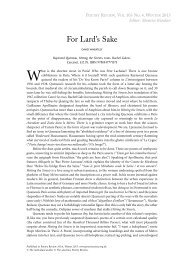
![Discussion points [PDF] - The Poetry Society](https://img.yumpu.com/51378364/1/184x260/discussion-points-pdf-the-poetry-society.jpg?quality=85)
